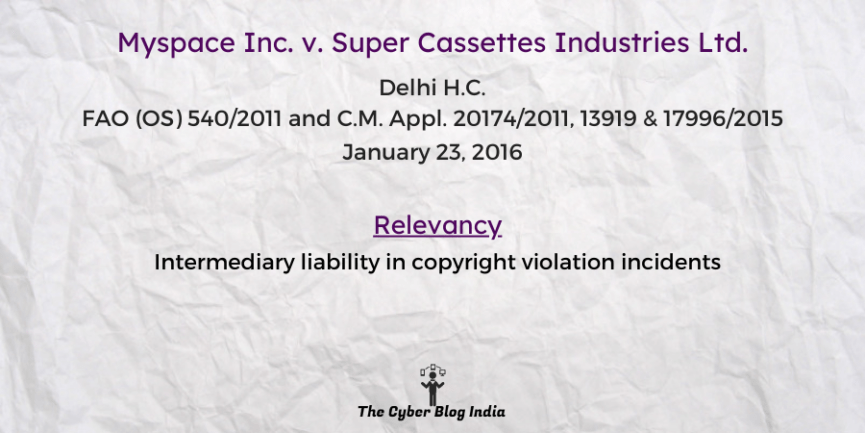Myspace Inc. v. Super Cassettes Industries Ltd.

Myspace Inc. v. Super Cassettes Industries Ltd.
(2017) 236 DLT 478 (DB)
In the High Court of Delhi
FAO (OS) 540/2011 and C.M. Appl. 20174/2011, 13919 & 17996/2015
Before Justice S. Ravindra Bhat and Justice Deepa Sharma
Decided on January 23, 2016
Relevancy of the case: Intermediary liability in copyright violation incidents
Statutes and Provisions Involved
- The Information Technology Act, 2000 (Section 79, 81)
- The Copyright Act, 1957 (Section 51(a)(ii))
- The Information Technology (Intermediary Guidelines) Rules, 2011 (Rule 3(4))
Relevant Facts of the Case
- The appellant was a social media website owner where third parties could upload and review content. The respondent is a well-known audio and video cassette production music company.
- The appellant claimed to be an Internet Service Provider (ISP) and an internet intermediary having global outreach.
- In 2008, the appellant offered the respondent the registration for its Rights Management Tools upon which the respondent found infringing content on the appellant’s website.
- The appellant in turn told the respondent that their content has been taken down and placed in a filter to prevent future violations.
- The respondent claimed to have sent notice to the appellant for the removal of content to which no heed was paid by the appellant.
- The plaintiff was granted an interim injunction. The appellant was dissatisfied with the order of the court and hence, filed an appeal in the High Court.
Prominent Arguments by the Advocates
- The appellant’s counsel argued that the relief provided by the single Judge was vague, general, and near impossible to comply with.
- The appellant’s counsel stated that the appellant was immune as per Section 79 of the Information Technology Act, 2000, as it acted as an intermediary.
- The appellant’s counsel states that Section 79 should be read in consonance with Section 81. This would mean that intermediaries would not be liable if they carry due diligence and have no actual knowledge of infringement.
- The respondent’s counsel stated that the respondent incurred business losses as the infringing content was uploaded on the appellant’s site.
- The respondent’s counsel also states that exceptions under Section 51(a)(ii) of the Copyright Act, 1957 would not be applicable as the appellant had the knowledge that infringed content is being uploaded on their website.
Opinion of the Bench
- The court opined that Sections 79 and 81 of the Information Technology Act, 2000 and Section 51(a)(ii) of the Copyright Act, 1957 have to be harmonious.
- The bench concluded that to impose liability on an intermediary, the conditions mentioned under Section 79 of the Information Technology Act, 2000 have to be fulfilled.
- The bench held that having apprehension of unlawful activities and having precautions for that would not amount to actual knowledge.
- The court ordered the respondent to furnish the list of work to the appellant to be removed within one week.
- In the case of internet intermediaries, interim relief should directly point at the rights being infringed.
Final Decision
- The impugned order was set aside.
- The appeal allowed.
This case summary has been prepared by Tuba Aftab, an undergraduate student at IIMT & School of Law, GGSIPU, during her internship with The Cyber Blog India in May/June 2021.
